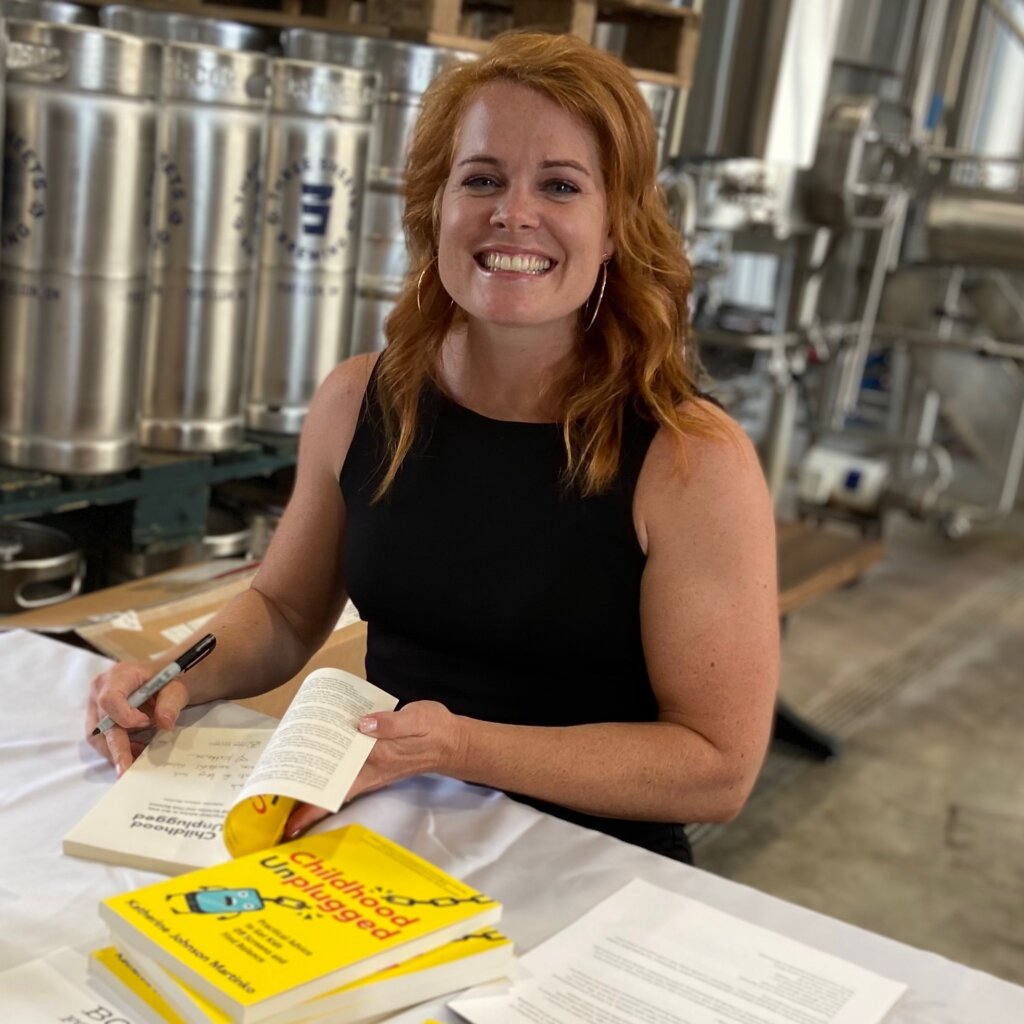






How to Get Kids to GO Outside and PLAY Outside
A lot of us would like our kids to go outside and play for a good long stretch. Instead, the little dears often come right back in and want a snack, or a drink (so do we!), or a screen (ditto). So thank goodness for Katherine Johnson Martinko. She’s a former senior editor at Treehugger. If anyone can get kids to go outside, play outside, and stay outside, she can!
Katherine is also the author of Childhood Unplugged: Practical Advice to Get Kids Off Screens and Find Balance. And she writes the Substack newsletter The Analog Family, promoting “digitally minimalist” parenting. She lives in Ontario, Canada, with her kids (who are, we must assume, outside).
Real-World Ways to Get Kids Playing Outside
by Katherine Martinko
As we all know (and remember from our own childhoods), kids thrive when they play outside. Outdoor play is great for developing strength, agility, resilience, confidence, and — no small thing — happiness. It can expose kids to important social interactions, cleaner air, and screen-free activities, while creating opportunities to feel awe at nature’s beauty.
We’d all be smart to prioritize outdoor play. Author Richard Louv writes that time spent in nature should be viewed as “an essential investment in our children’s health” and that it should be “taken out of the leisure column and placed in the health column.” In an ideal world, outdoor play would be considered as important as eating well and getting a good night’s sleep.
Why AREN’T more kids out there?
Knowing this, why do we have such a hard time getting kids outside?
Researchers from the universities of Strathclyde and Ottawa say that the problem lies less with access to outdoor play spaces and more with a culture that fails to prioritize outdoor play. They have found that a lack of outdoor play is linked more to one’s social environment (meaning, norms and habits) than to one’s physical environment.
So, how do we change those norms and habits to promote outdoor play? I have some suggestions, based on personal experience and observing other families.
As promised: Real world, outdoor play prompts!
- Make it a regular thing: Make daily outdoor play a prerequisite for any “extra” things that might happen afterward (even homework, but especially screen time). This may sound harsh, but kids will actually appreciate the routine. It’s like mandating corn. It’s a vegetable. But it’s delicious!
- Every bit counts: Don’t wait for a big chunk of time. Send kids out for 10 minutes, if that’s all you have. They can run around the block, dig a hole, or build a quick snowman, and it will make a difference to their mood and energy level.
- Set a timer: Tell your child they have to stay outside for a set number of minutes. It’s amazing how motivating this is (truly – it means so much to them), and they’ll often end up staying out longer.
- Walk to school: A twice-daily walk will do wonders for your child’s focus at school. Establish a safe route, walk it together until they’re ready to go solo, and then wave them off.
- Schedule (and make good on) outdoor time on weekends: Plan longer outings for the whole family. This models an outdoorsy life and enables bigger, skill-based activities like hiking, cycling, skiing, and swimming.
- Make your yard interesting: Look around the house for versatile “loose-part” toys that can be played with outside—cardboard boxes, old suitcases, buckets, cups, and more. “Inside toys” don’t have to stay inside.
- Buy appropriate clothing: A warm, dry kid is a happy kid. Buy high-quality gear, second-hand if possible.
- Eat outside: When the weather is good, have picnics on your balcony or front step. Kids will often start playing nearby if you’re there.
- Don’t avoid darkness: It can feel exciting to a child to play in the dark, especially with siblings or friends. Make use of early morning hours to squeeze in playtime before school.
- Use urban green spaces: Commit to visiting city parks each weekend or incorporate them into your weekdays as a refreshing “micro-adventure.”
- Sign up for outdoor extracurriculars: Prioritize sports and other activities that keep kids outside, rather than cooped up indoors.
- Invite kids for outdoor play dates: Tell other parents to dress their child accordingly. Your own kid will be more inclined to stay outside for longer if they have a playmate. Conversely, a warm, dry parent is a happy parent!
Hopefully, these tips can help you make outdoor play a bigger part of your family’s day-to-day life. Fresh air, exercise and happiness are sure to follow.
Let Grow here: And why not clear Fridays for neighborhood free play? Unscheduled kids are ready-to-play-outside kids! And if you’d like, here’s their free Let Grow Kid license!




Great tips! Thank you!
My brothers and I grew up on military bases as well as living off base in Japan. The last thing we wanted to do was spend our time indoors; we were either outside playing with each other or with kids in the neighborhood. In Japan, we’d take the train or buses on our own (as young as first grade) to visit friends from school. Even now when I visit Japan, I see young school kids, alone on trains.
When my boys were young, we spent one year living in a town (we’d always lived in rural areas with no neighbors nearby), so I encouraged them to go out and talk to the kids I saw across the street. It didn’t go well and they came home in tears because they weren’t welcoming. After that, I always had to make an effort to coordinate get-togethers (years before “play dates”) and signed them up for activities with other kids.
Now I see my grandkids, isolated from those social interactions outside of school, and it makes me very sad to think about what opportunities they are missing out on. In my career with the government, I met a lot of young adults who seemed to have difficulty interacting socially with others. I often wondered if it had to do with not having those opportunities that came so easily for us.
I appreciate what I learn from these articles and share them with my son to help the grandkids develop the social skills they need to grow up healthy and happy.
Some kids, like my older son, would never just wander off to find their own fun in the neighborhood and does need to be encouraged to do it. My younger son takes more after me genetically and is way more eager to explore and find friends and fun. We are really privileged to now live in a relatively safe, walkable neighborhood where that’s possible.
On a related note, not all of us parents had the same experiences and opportunities growing up and so letting (or encouraging) our kids into the neighborhood to find their own fun isn’t something intuitive to us. I was, in fact, trained by my then abduction-concerned parents that I should NEVER let my kids out of my sight, almost no matter what. We didn’t live in a neighborhood where that was common, and indeed it never happened to anyone we knew, but the media at that time did its work on my parents as on so many others. It’s my nature to lean against that sentiment, though I hear it echoed by other parents semi-often on outings who’ve noticed (for example) that I haven’t run in a panic after my boys when they turn a corner ahead of me. I’ve had interactions like that everywhere I’ve lived so far, and none of them have been places abductions are common, so I believe it’s a popular concern.
As individuals, none of our experiences – nor our privileges – are universal, but this article does address my experience and situation enough that I’m grateful it’s here. Thank you, author(s)!
I’d like to gently push back, only to point out that we don’t all live in a neighborhood with other kids. We live in a small neighborhood with mostly retired people. So if our kids want to play with other kids, we have to go to them or invite them over. And living in a rural place area we have to drive to get there. We don’t have sidewalks—or even shoulders on the road—to walk. It also means I get to see my friends—play dates aren’t just for kids! Adults need them too.